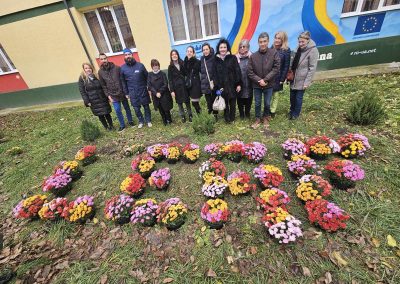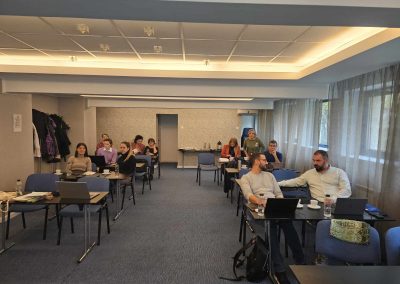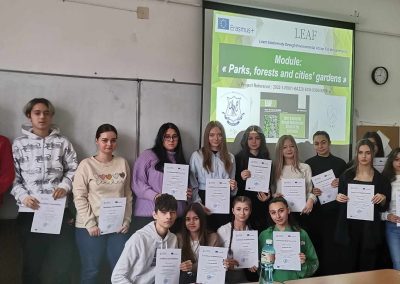TRAIN THE TRAINER’S ACTIVITY
Train the trainers activity organised by P1, MENC (RO), in November 2023
The activity involved each partner’s expert who trained the other participants during the workshops that had the following topics: Climate change and urban biodiversity (Module developed by ENERGIES2050), Protected natural areas (Module developed by PLATON), Urban parks and forests (Module developed by MENC), Water biodiversity (Module developed by LINKGroup), Boosting digital skills of teachers (Module developed by Dlearn), Cooperation with local community (Module developed by PASBS)
Teachers play a crucial role in supporting learner development and are key change agents in school development. Our project encourages the transformation of schools into “open learning organisations”, enabling teachers and school leaders to improve both their pedagogical and their organisational practices concurrently through local collaborative research, networking and continued professional development. By training teachers on service-learning and citizens science, LEAF contributes to develop school leadership and strengthen the school’s relation with the community.
Biodiversity fits well not only with science and geography curricula, but also with several other subjects, especially when the learning is taken outside the classroom. For example, monitoring biodiversity provides a wealth of data which can be used in the classroom to support numeracy lessons. Nature has provided for centuries inspiration for poetry, art and literature too. Biodiversity is also the context for citizenship discussions. Furthermore, at secondary level it helps develop an ecological thinking and systems thinking approach by studying the chains within ecosystems and the impact of natural processes on human well-being.
This activity aimed to:
- Create a new service-learning methodology for secondary schools targeted to the monitoring and protection of local plant biodiversity.
- Increase the percentage of European plant environments actually monitored on a regular basis.
- Promote a new model of grassroots citizen-science initiative dedicated to plant biodiversity performed by schools;
- Enhance the quality of STEM learning for secondary schools’ students through innovative project-based methodologies.
- Link student’s syllabus and learning objectives with real needs from the community, thus going beyond the old passive learning method where students just receive information from teachers, with no feedback or practical application.
- Increase students’ engagement and participation, thus combating early school drop.
- Promote active citizenship, environmental protection, social inclusion and the establishment of long-term structured cooperation between schools and local stakeholders.
Thus, our training activity succeeded to:
- Support the development of sustainability competences in line with the European Sustainability Competence Framework (GreenComp). It can do so through an innovative and multidisciplinary teaching approach that promotes civic engagement and experiential learning.
- Raise awareness about the importance of biodiversity and the need to protect nature and promote the importance of citizen science to monitor plant biodiversity. Through education, the project aims to make teachers and students agents of change.
- Provide teachers with a unique Continuous Professional Development opportunity to improve their skills in using innovative and multidisciplinary teaching approach.

This project has been co-funded with support from the European Commission. This communication reflects the views only of the author, and the Commission cannot be held responsible fo
Project N°:2022-1-RO01-KA220-SCH-000086884




